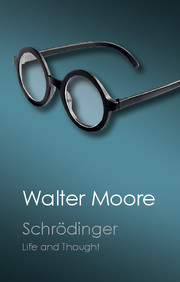Book contents
- Frontmatter
- Contents
- Preface
- Chronology
- Introduction
- 1 Family, childhood and youth
- 2 University of Vienna
- 3 Schrödinger at war
- 4 From Vienna to Zürich
- 5 Zürich
- 6 Discovery of wave mechanics
- 7 Berlin
- 8 Exile in Oxford
- 9 Graz
- 10 Wartime Dublin
- 11 Postwar Dublin
- 12 Home to Vienna
- References
- Name index
- Subject index
1 - Family, childhood and youth
Published online by Cambridge University Press: 05 October 2015
- Frontmatter
- Contents
- Preface
- Chronology
- Introduction
- 1 Family, childhood and youth
- 2 University of Vienna
- 3 Schrödinger at war
- 4 From Vienna to Zürich
- 5 Zürich
- 6 Discovery of wave mechanics
- 7 Berlin
- 8 Exile in Oxford
- 9 Graz
- 10 Wartime Dublin
- 11 Postwar Dublin
- 12 Home to Vienna
- References
- Name index
- Subject index
Summary
Heredity or environment, nature or nurture, there is no general solution to the problem of how much each contributes to the structure of a personality or the achievements of a person. It has been said that any medical student can become an adequate surgeon provided he or she is willing to work long hours, follow the hospital rules, and placate the nursing staff. In other words, this particular skill is not significantly determined by genetic factors. No such prescription can be applied to mathematical physics; original work in this field requires a special kind of native aptitude, the genes must be right. This is a necessary but not a sufficient condition. A potential schrödinger may be lost to physics if he happens to be born in a Bengali village rather than a university town.
Many theoretical physicists have come from academic families, which, at least in Germanic countries, are considered to be upper middle class on the social scale. The fathers of Max Planck, Niels Bohr, Max Born, Wolfgang Pauli and Werner Heisenberg were all university professors, of Law, Biology, Anatomy, Colloid Chemistry and Byzantine Studies, respectively. Paul Dirac's father taught French at a Bristol grammar school, in the English context, a respected but lower-middleclass profession; Paul originally aspired only to be an engineer, but turned to pure theory after his ineptness in practical work became evident. Albert Einstein's lower-middle-class background was exceptional among German scientists. The Einsteins lived in an industrial suburb of Munich, and the early stages of Albert's scientific career were unusually precarious.
Thus the ancestry and family history of Erwin schrödinger are relevant to the story of his life, even if the relative contributions of genetics and economics cannot be clearly separated. Fortunately his Aunt Rhoda compiled a history of his mother's side of the family; less is known about the schrödinger side.
Family history
The story begins with Franziska Zickler, who was a love child of unknown parentage, born about 1780 in a convent in Hungary where her mother had taken refuge. From certain resemblances, it was thought that she may have been related to Josef of Habsburg-Lorraine, a son of Maria Theresia. She grew up to be a temperamental beauty and married a member of the minor nobility, Anton Wittmann- Denglass who was born at St Bernard in Lower Austria in 1771.
- Type
- Chapter
- Information
- SchrödingerLife and Thought, pp. 7 - 31Publisher: Cambridge University PressPrint publication year: 2015



